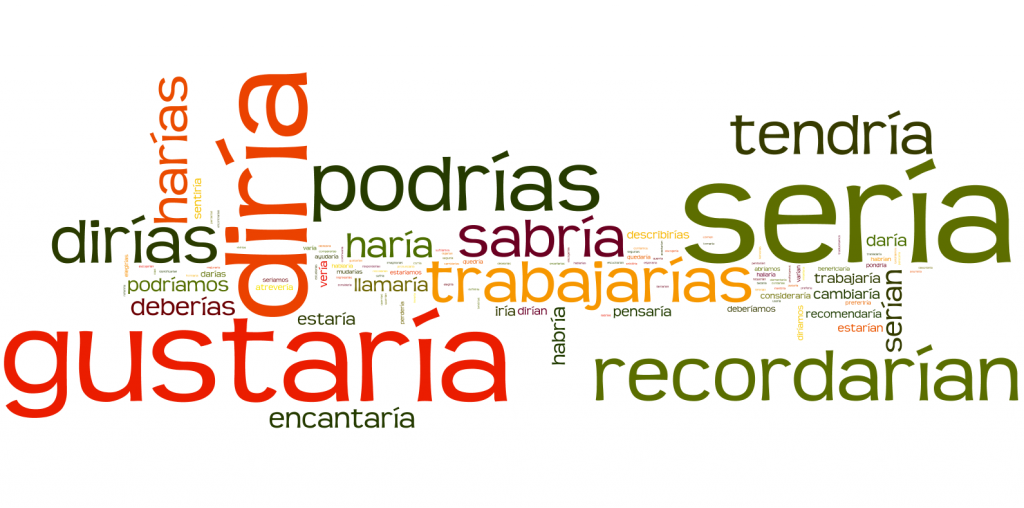The conditional (condicional) is used to refer to hypothetical events. It occurs in polite requests and most frequently with si (if) clauses. It is most often translated as would in English.
Formation
The conditional is conjugated by taking the infinitive and adding the appropriate endings (these are also the -er and -ir verbs imperfect endings)as in the following table:
| hablar to speak | |
|---|---|
| yo hablaría | nosotros/as hablaríamos |
| tú hablarías | |
| él/ella/usted hablaría |
ellos/as/ustedes hablarían |
But, that would be a dream.
Stem Changers
Verbs with irregular future stems use the same irregular stems in the conditional. Here is a list of the most common irregular stems:
- Tener and its compounds (mantener, obtener, etc.): tendría, tendrías, tendría, mantendríamos, obtendrían, etc.
- Haber: habría
- Venir: vendría, vendrías, vendría, etc.
- Decir: diría, dirías, diría, etc.
- Hacer: haría, harías, haría, etc.
- Poner: pondría, pondrías, pondría, etc.
- Salir: saldría, saldrías, saldría, etc.
- Poder: podría, podrías, podría, etc.
- Querer: querría, querrías, querría, etc.
- Saber: sabría, sabrías, sabría, etc.
I would have to say it is an accent that is more similar to the Mexican one… because of the border.
Uses
Wishes or Requests
The conditional expresses potentiality. It is used to express a wish or a suggestion, to make a request, or to accept or extend invitations. It is less direct and more polite than the imperative. The verbs podría, querría, and debería are often found in the conditional to diminish the strength of a command. In most cases, the conditional is translated as meaning would in English. However, podría means I could, debería means I should and querría means I would like.
No me gustaría que me dejaras, me gustaría mejor que te casaras conmigo.I wouldn’t like you to leave me, I would prefer you to marry me.
Hypothetical Action
The conditional is used when making statements which are contrary to present facts. It expresses a hypothetical result which depends on (stated or implied) circumstances which do not exist. In order for the action expressed by the conditional to occur, something else must take place first. Note that the condition in the si or if clause, is always stated in the subjunctive (imperfect or pluperfect).
Si fuera lugar u objeto, yo diría que la televisión.If it was a place or an object, I would say television.
For more details about hypothetical clauses see also the page about si clauses.
Reported Speech (Indirect Discourse)
In addition, the conditional is used to represent the future in relation to a narration in the past when reported speech is used to tell what someone said.
Laura me dijo que vendría.Laura told me that she would come.
For more details about reported speech see also the page about indirect speech.
